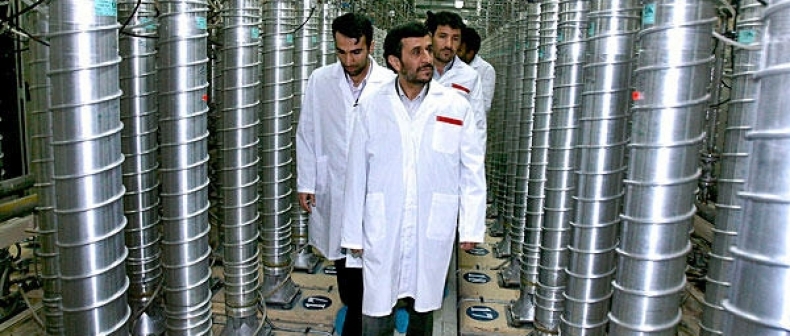
The prospect of nuclear war between Israel and Iran over Iran’s disputed civilian nuclear program is ever-present as both sides attempt to determine the others intentions while preparing for the worst. The heart of the conflict is a debate over the true intentions of Iran’s nuclear program: Iran has long argued the nuclear program they are developing, one of the worst kept secrets in the Middle East for many years, is purely civilian in nature. But others in the West are skeptical.
Western reactions to the Iranian nuclear saga are far from homogenous – Israel, because of close proximity to Iran, has long argued a harder line against Iran than most. Britain, France, and the United States have sought a more moderate approach to Iran via sanctions as opposed to overt military actions, though ultimately supporting Israeli motivations for pre-emptive violence. Russia and China have consistently shown moderate support for Iran, asking for an end to sanctions and for the West to refrain from meddling in Iranian internal affairs.
To better understand the escalating conflict, here, then, is a brief timeline of the Iranian nuclear situation:
OCTOBER 12, 2011: The United States uncovered an alleged Iranian plot to pay a Mexican drug cartel to murder the Saudi Arabian ambassador to the United States in a Washington, D.C. restaurant. Despite Iran laughing off the plot rumours, this began a new round of U.S.-led efforts for the international community to isolate Tehran, with U.S. Vice President Joe Biden insisting it not be seen as a United States vs. Iran conflict, but a united, global front against the country. “These are cheap claims,” noted Iranian Parliamentary speaker Ari Larijani. “We have normal relations with the Saudis. There is no reason for Iran to carry out such childish acts.” Even U.S. Secretary of State Hillary Clinton thought it was strange enough to remark: “nobody could make this up, right?”
NOVEMBER 3, 2011: Despite the International Atomic Energy Agency (IAEA) plan to report on their probe into Iran’s nuclear program, Israel’s Prime Minister Benjamin Netanyahu began rallying support in his cabinet for a pre-emptive strike against Iran. After Israel successfully tested a missile capable of carrying a nuclear warhead into Iran, Netanyahu thought it prudent to begin consolidating support for such an action based on the assumption that if Iran does in fact have nuclear weapons capabilities (as Israel believes they do), his country would be the primary target of Iranian nuclear aggression.
NOVEMBER 8, 2011: The IAEA released a report asserting they have credible new evidence of a weapons-based purpose for the Iranian nuclear program. It is the strongest condemnation of Iran’s nuclear program in a decade, and one of the most intensive efforts to “pierce the secrecy” of the program. But cognizant of the 2003 “intelligence” report on Weapons of Mass Destruction in Iraq, the IAEA thoroughly explained the broad origins and nature of the data gathered from 10 different national governments, independent agencies and interviews in a section entitled “credibility of information.”
NOVEMBER 9, 2011: After the release of the IAEA report, Iranian President Mahmoud Ahmadinejad alleges the United States is using the IAEA as a “stooge” in its efforts to bully international public opinion against Iran. Ahmadinejad argued the report was a set-up for Israel to make a pre-emptive strike against Iran, and restated that Iran “does not need a bomb.” Germany, France and Britain all signaled a greater willingness to support U.S.-based sanctions as a result of the report and subsequent Iranian reaction.
NOVEMBER 21, 2011: With European support, the United States moved to apply significant financial pressures on Iran (sanctions) in retaliation for moving ahead with their nuclear program. The move was intended to cut Iran off from global financial institutions and apply pressures to their central and commercial banks, as well as to companies involved with Iran’s nuclear, oil and petrochemical sectors. Canada entered the fight, joining the United States and Britain in limiting Iranian access to foreign credit. “The message is clear,” said Hillary Clinton. “If Iran’s intransigence continues, it will face increasing pressure and isolation.”
JANUARY 27, 2012: Seemingly unfazed by global sanctions, Iran asked to call a meeting with other world powers (Britain, China, France, Germany, Russia and the United States) to discuss its nuclear program and uranium enrichment facilities. The call for talks came after European Union foreign policy chief Catherine Ashton suggested all parties pick up where negotiations left off in Istanbul, Turkey a year ago. “They have this excuse that Iran is dodging negotiations while it is not the case,” Mr. Ahmadinejad told Iran’s state media. “A person who has logic and has right on his side, why should [he] refrain from negotiations?” The U.S. State Department insists on Iran’s “coming clean” about their nuclear program as a prerequisite for talks.
FEBRUARY 19, 2012: Iran moved to cut off oil exports to Britain and France, threatening other EU nations with similar bans through their state media should tensions escalate. Iran’s deputy Oil Minister, Ahmad Qalebani, claimed that “if the hostile actions of some European countries continue, the export of oil to these countries will be cut.” Concurrent with the ban, Iran announced several days of military maneuvers in preparation for real-life protection of their nuclear sites. Iranian naval vessels have moved into the Strait of Hormuz, ostensibly to protect nuclear sites, but also to assert their control over the strait where roughly 20 per cent of the world’s oil passes through.
FEBRUARY 21, 2012: Iran warned of pre-emptive action against Israel if it believed they are planning a strike against Iran’s nuclear program. This is the most openly bellicose tone that Iran has struck on the matter in the past year. Mohammed Hejazi, Iran’s deputy armed forces head, told state media that “our strategy now is that if we feel our enemies want to endanger Iran’s national interests, and want to decide to do that, we will act without waiting for their actions.” This came after increased restrictions were placed on UN officials hoping to gain access to Iran’s nuclear facilities.
The conflict between Iran and the West over its nuclear program is on-going, and cooler heads have yet to prevail. Iran appears willing to meet with other nations to discuss their nuclear ambitions, but is less willing to fundamentally alter the nature of their nuclear program, or at least welcome the international community in to prove the absence of a weaponization program. Without any measure of trust between Iran and the West, and certainly no love lost, the talks are bound to be hollow if not followed by globally-measured and accountable actions not only for Iran to renounce any military ambitions for their nuclear program, but for the West to lift sanctions that are typically more harmful for civilians than the government.
Yet the U.S., Britain and France are right to pressure Israel to halt their escalating rhetoric of pre-emptive violence for its own sake. Now is not the time to play with fire. There is a way to deescalate the tension while allowing all parties to save face; it merely requires a willingness on all sides not to resort to nuclear war over suspicions of intent.
Ideally, this is something humanity should be capable of.
Andrew Reeves writes the Morning Cable (and other stuff) for Toronto Standard.














